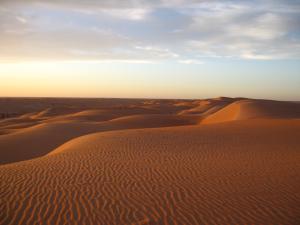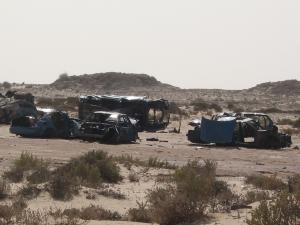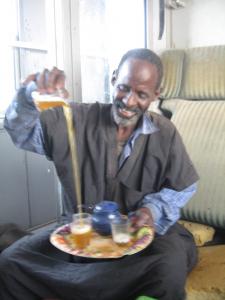My husband, Jason, and I were six months into our 15-month around the world trip. We were about to embark upon one of our more ambitious undertakings: crossing the Sahara desert. We’d journeyed south through Morocco, made it to Dakhla, the furthest any bus would take us. Our plan was to travel through western Sahara (a territory under dispute between Morocco and Mauritania), across the Mauritanian border to Nouadhibou, east to Choum and finally to Atar, where we’d find camels to accompany us on a desert trek.

Winging the Grand Plan
We were excited about this grand plan, not concerning ourselves with minor logistical details like how to execute the journey without our own transportation. We’d heard about a freight train from Nouadhibou to Choum which sounded viable, but hadn’t figured out the Dakhla-Nouadhibou leg, a route beyond public transport networks. We weren’t worried, though.
“Winging it” is, after all, part of the adventure. Supply and demand suggested there must be someone in this public transport deprived town willing to drive us a few hundred miles for a reasonable price. So we asked around Dakhla, in search of some such enterprising individual. We were advised by several locals to wait for a driver in front of the Hotel Sahara the next morning. We did. Sure enough, the first entrepreneur soon appeared, touting for potential passengers. He wore knock-off Ray Bans, an Adidas tracksuit – not quite the uniform you’d expect from a private chauffeur. However, he had a decent looking Mazda sedan, seemed genuine and friendly. A deal was struck for a ride to Nouadhibou. We jumped in before he changed his mind about the price, or filled the car with other passengers.
Saad – helping us wing the plan
With the Mazda’s stereo turned up, we hit the road, driving through rough, rocky terrain. Saad, our driver, pulled over after a couple of hours to brew Mauritanian tea. He used lots of green tea and a little mint, the first pot brewed was strong and bitter. Saad added water and heaps of sugar and brewed it a second time. We drank, then he brewed a third time to conclude the ritual.
After another stint of barren landscape, we stopped for a long lunch break, since Saad said the border was closed until three. On arrival at the border post, we found a cluster of cars from the Plymouth-Banjul rally, whose drivers looked well cooked from their long wait in the sun, evidently oblivious to the dining schedule of the police and custom officials. Saad pulled up and proceeded to greet all the locals like long lost friends. He went through a lengthy greeting ritual “Salaam! Ça va? La bas? Hamdullah! La bas? Ça va?” a fluent, simultaneous exchange universal between Moroccan men, then chatted for a good ten minutes with each of them. He seemed to know everyone. Any misgivings about our Ray Ban/Adidas clad driver gave way to the realization we’d hired a pro; much better than hitching with rally drivers or a camper van, options we had considered.

It was hard to know who was processing what or even who worked at the border post. It looked like the British rally drivers could be there all afternoon in an orderly queue. For us, clearing customs basically involved Saad chatting with his mates in the customs office. We breezed through the police checkpoint (another few minutes of chat) before entering the unpaved road into the place where the disputed territory of western Sahara and Mauritania meet. This was truly a no man’s land, strewn with litter and shells of blown up cars – disturbing signs that the area was full of land mines, as we’d been warned. We wove around the rocky road, gob smacked by the car shells and relieved that Saad knew what he was doing, since there were plenty of side roads to baffle a novice.
Shortly after what looked like a car park (actually a holding lot for cars confiscated by customs), Saad pulled over. He nonchalantly sauntered into the minefield and started digging with his hands. He pulled out a pair of Moroccan license plates, and quickly buried his Mauritanian plates in their place. This would make things easier with customs, he explained. Clearly Saad knew what he was doing. But burying plates in a live minefield? It took us a while to get our heads around that one.
I began to wonder if Atar was worth this white knuckle section of the route. Would our long awaited round-the-world trip come to an abrupt and unpleasant halt here in western Sahara? My worried thoughts were interrupted by Saad pointing out the shell of a shiny camper van. A French couple had apparently taken a wrong turn the previous week and blown themselves up. We pressed on, soon approached the Mauritanian border police, a welcome sight in their rolled up pants and flip flops, signaling a safe arrival in a new country.
The predictable ten-minute chat with Saad ensued, then we continued to the customs office, a shack with flattened cardboard boxes for a ceiling, and plastic tablecloths lining the walls. Entering Nouadhibou, we drove by dubious butcher shops with meat barely visible for flies, scrap Renaults being patched up, old Mercedes rammed to the gills with people and cargo, and black and brown skin. This was a much different Africa to Morocco. We thanked our savior and friend, Saad, watched him peel away with Mauritanian music screaming from the Mazda.
Freight train to Choum
We spent the night in Nouadhibou before the next leg of our journey: the freight train to Choum. Arriving at the train station two hours before departure, we were determined to get seats in the solitary passenger car on the iron ore train. With fly infested litter strewn around, peeling paint and graffiti, this was a no frills train station, but we were glad of its shady benches as we observed the unfolding scene.
The refreshment vendors – three women with a table and chair each with boxes and buckets full of stuff – were the first to arrive. They unpacked and displayed their wares: cigarettes, sweets, biscuits, gum, water, soda, tissues, sardines, gas canisters, matches, boiled eggs, fruit, flashlights, batteries – everything a person might need on a night train through the desert. We watched cargo being hauled to the track by men and their tired donkeys, strained by the hot, heavy work. Passengers began to assemble by the tracks, with their boxes, suitcases, buckets and bags, positioning themselves for the onslaught. A chatty Mauritanian assured us it was a good thing we arrived early, since boarding the train would be “war”.
The train was surprisingly punctual. We waited patiently for the 2.5 kilometer long string of open containers to pass, priming ourselves to charge the passenger carriage. Before the train even stopped, people were grabbing bars and jumping on, some going straight for the windows. Policemen were stationed at each door, trying without success to keep order. Aided by some unfriendly but necessary elbowing, Jason and I made it onboard, scrambling up from the track between a policeman and a filthy toilet filmed with sand. We struggled into the hallway, optimistically scanning shabby berths for seats amidst the commotion.
The whole carriage was crammed full with people and cargo. We’d blown it. Arriving two hours early, sweating in the track-side sun, pushing and shoving like the locals, had not been enough. Maybe we would have been better off riding in an empty iron ore container. But Jason wasn’t ready to give up. Impressively, he persuaded a Mauritanian man in gold embroidered blue robes to pile up his cargo and clear two spaces for us. We were delighted to have secured "seats", even though they were basically bare seat frames with a few tired springs. We found some bits of foam to sit on, but they barely cushioned us from the protruding springs. The window of our berth was shattered, the light fittings had long since been removed; everything was caked in thick Saharan dust and we were next to the stinky toilet. Nonetheless, we were excited when the train set off with a jolt. We were on our way; eastbound on what is reputedly the longest train in the world.
The view leaving Nouadhibou was depressingly marred by mountains of rubbish, with thin plastic bags fluttering in the wind like ugly everlasting weeds. Eventually we left the litter scape and were truly in the wilderness – the train, the desert and us. I stood by the open window gazing out for miles, ignoring the dust that filled my face, clothes and lungs, knowing that after sunset, there would be nothing to see. The headscarves and "howlis" (cotton head cloths) worn by locals clearly serve a purpose, although we had neither).

There were two other occupants in our berth, and they were soon busy brewing up Mauritanian tea with filthy equipment. We were apparently sharing a berth with the train’s refreshment vendors, which meant a steady stream of customers coming by for a tea or three. Each pot brewed involved a long process of pouring the tea from glass to glass until frothy and well mixed.
It was amazing to watch Jamal the master tea maker at work – pouring on this bumpy train, never spilling, not even when the train screeched and jammed to abrupt halts. He had been doing this for twelve years. In spite of his grimy tools and supplies, he was a professional. He was also friendly and caring – finding us blankets, extra bits of foam, giving us regular updates on how far along our 460-kilometer train journey we were. The smell of Jamal’s cigarettes provided occasional relief from the increasing stench secreting toilet, too. I had decided early in the journey I would not need the bathroom until we got off the train.
At sunset, the hallways filled with Muslims praying on the floor. The sound of their voices was a soft and soothing contrast to the noisy rhythm of train on track. By the time we settled down to sleep, we’d made friends with Jamal and Mohammed (the tea guys), Sidi Mohammed (our original Mauritanian berth mate), Ahmed (who promised to help us find transport to Atar from Choum), and an unknown stranger who kindly gave Jason a piece of his "howli".
It was impossible to get anything close to comfortable, but I developed a technique of sitting one bottom check on a spring until it was really sore, then shifting so the spring pressed somewhere else for a bit. It was just about workable.
At Choum, we wove our way through motionless blanketed bodies in the hallway and jumped down onto the track. Pickup trucks were waiting – we piled onto one with Ahmed and other weary passengers and their cargo. Everyone helped each other get situated as we each shuffled for a tolerable spot on the lumpy, bumpy and cramped truck. It was 3:30 a.m. when our truck left for Atar – loaded with seven adults, one baby and a goat inside, and eight adults in the back. As the only female in the back, surrounded by young men in pitch darkness, I was grateful to be in a Muslim country, confident I would not be touched. Tiredness numbed our senses to the discomfort; we gazed at the stars during our semi-conscious ride.
After several hours on a bouncy dirt track, we pulled into Atar as day was breaking. We stumbled towards the center of town, found a restaurant and sat down. The owner produced two fabulous omelets with chips and some juice in time to rescue us from exhausted and hungry collapse. With full bellies, we made our way to a quiet campground in the desert, where we crashed in a comfy hut. Sahara crossing accomplished.
>> Read more about train travel in Africa from Runaway Jane.